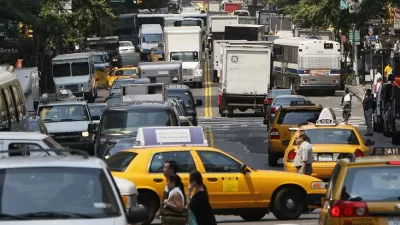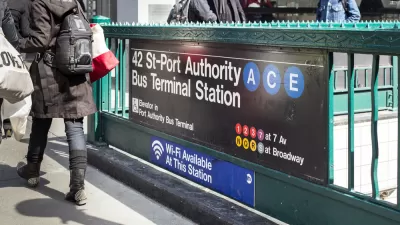Following the lead of programs in Los Angeles, Portland, and Baltimore, a pilot program by the New York Metropolitan Transportation Authority will install warning systems to alert pedestrians to turning buses.
"Pedestrians at city intersections will receive warnings when a bus is turning — from the bus itself — under a pilot program being developed by the MTA," reports Pete Donohoe.
"The pre-recorded safety messages will be played through speakers mounted on the exteriors of buses in the program, which is expected to be launched in the fall."
"Another 'collision avoidance' pilot in the works will use radar and sensors to detect — and then alert — bus drivers of pedestrians, bicyclists and motor vehicles in the immediate vicinity, including so-called 'blind spots.'"
The article provides more details about the pilot program and providers of the technology that will deploy the alert system.
FULL STORY: Buses will blare warnings through speakers to alert pedestrians at corners under MTA pilot program

Planetizen Federal Action Tracker
A weekly monitor of how Trump’s orders and actions are impacting planners and planning in America.

Chicago’s Ghost Rails
Just beneath the surface of the modern city lie the remnants of its expansive early 20th-century streetcar system.

San Antonio and Austin are Fusing Into one Massive Megaregion
The region spanning the two central Texas cities is growing fast, posing challenges for local infrastructure and water supplies.

Since Zion's Shuttles Went Electric “The Smog is Gone”
Visitors to Zion National Park can enjoy the canyon via the nation’s first fully electric park shuttle system.

Trump Distributing DOT Safety Funds at 1/10 Rate of Biden
Funds for Safe Streets and other transportation safety and equity programs are being held up by administrative reviews and conflicts with the Trump administration’s priorities.

German Cities Subsidize Taxis for Women Amid Wave of Violence
Free or low-cost taxi rides can help women navigate cities more safely, but critics say the programs don't address the root causes of violence against women.
Urban Design for Planners 1: Software Tools
This six-course series explores essential urban design concepts using open source software and equips planners with the tools they need to participate fully in the urban design process.
Planning for Universal Design
Learn the tools for implementing Universal Design in planning regulations.
planning NEXT
Appalachian Highlands Housing Partners
Mpact (founded as Rail~Volution)
City of Camden Redevelopment Agency
City of Astoria
City of Portland
City of Laramie





























